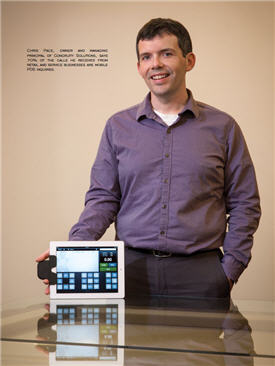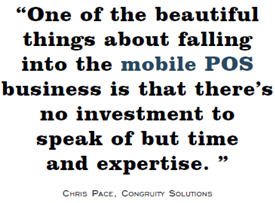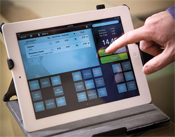Small VAR Goes Big-Time With Mobile POS
By Matt Pillar, Business Solutions magazine
Chris Pace helped a pal who owns a coffee shop set up mobile POS. Next thing he knew, he was a POS VAR. Congruity Solutions is now the go-to provider of mobile POS for more than a dozen shops in Phoenix.

Chris Pace didn’t expect success selling mobile POS systems. He wasn’t even looking for it. By trade, Pace is a business analyst specializing in healthcare who — almost reluctantly — calls himself a POS VAR now.
In the summer of 2011, Pace had some time to kill in the midst of a career change. A friend of his, who operates a hip coffee shop in Gilbert, AZ, needed a new POS system. Pace offered to help and, after conducting some research, convinced the coffee shop owner to try ShopKeepPOS, an iOS POS application, on an iPad. Pace was the application’s first reseller, and he plugged it in for the first time in beta.
The coffee shop owner liked it. His customers, many of them independent business owners themselves, liked it too. Within days of helping his friend deploy the iPad POS application, Pace was taking calls from independent retailers and restaurants from around the Phoenix area.
That was about 20 months ago. Today, the healthcare business analyst-turned-POS VAR serves a dozen retail, hospitality, and small business customers under the Congruity Solutions moniker.
“This is an interesting and sort of weird path that I never planned for or counted on,” says Pace. With an MBA under his belt, he is well aware that the way his new business developed is a bit nontraditional. “Most new businesses develop a product and a sales model, then go out and create demand. We found ourselves faced with huge demand, so we built a product and sales model to meet it.”
The approach is turning out quite lucrative for him, thanks in no small part to the recurring revenue he’s making on the payment processing services he resells. It’s also opened a lot of doors to another facet of this techno-renaissance man’s skillset: Web and social media development.

Pace’s willingness to offer services that most VARs don’t — or can’t — puts him in a good competitive position that appeals to the independents he serves. “Start-up and independent restaurants and retailers often don’t have rich websites and SEO [search engine optimization] and social media presences, nor do they have the time or expertise to tackle these things in-house and integrate them with the POS,” explains Pace. “But those two sides of the business — what they’re doing online and what they’re doing in stores — are complementary. One drives the other.” That’s a synergy that’s been lost on the great VAR community, and there’s no exception in Phoenix. No other tech business in the city is offering this combination of goods and services. And surely no one else is doing it for a single up-front fee, with no monthly charge and free support service for the life of the install.
Mobile POS Drives Volume, E-Commerce Drives Loyalty
The interest in mobile POS, particularly on the iPad, has business booming. Pace says 70% of the calls he receives from retail and service businesses are mobile POS inquiries. “I anticipate the ‘cool factor’ for mobile POS will fade a bit, but for right now, small businesses are clamoring for it.” He finds that a bit ironic, given that he considers ShopKeep more “widget” than software program. “The POS part is pretty simple — it’s setting up the application and showing the customer how to use it. People are afraid of that stuff, and I’m not, which creates a great consultative business opportunity,” he says. And, because ShopKeep nurtured the relationship in its beta stage, it quickly became lucrative for Pace to align with them. “ShopKeep extended its one-month trial to six months for my initial clients, which gave me an incredible value proposition. If they chose me and ShopKeep, they’d get it free for the first six months, with support.”

That support, he says, proves a minimal effort. A lot of the issues his customers encounter are rectified by a reboot of the iPad, which works out well for Pace, given that he charges nothing for the support he offers. If heavier lifting is required, he goes to ShopKeep, but he’s careful to maintain the first degree of contact. “The POS sale might be my first foot in the door. The support we give customers on POS issues causes them to think of Congruity Solutions for other things — like Web design, SEO, and e-commerce integration,” he says.
Those services, as well as payment processing residuals, are where Congruity Solutions makes its money. And make money it does. The bootstrapping company forecasts 100% growth in 2013, and Pace recently hired a full-time employee to support growth on the Web and social/SEO services side of the business. That employee is a graphic designer and Web developer, a position that requires equal parts artistic and technical ability. “When you start a business and try to grow it, your biggest obstacle is often yourself. You can get in your own way if you’re not realistic about your capabilities.” For his part, Pace was able to admit that while he considers himself a better-than-average coder and technician, problem solving is his greatest strength.
“Having a qualified Web architect and designer on board allows me to focus on lead generation, sales, and problem solving for our new clients.”
The New Opportunity: Residual Revenue
To be clear, the aforementioned payment processing residuals that supplant service fees for Congruity Solutions are no mere afterthought. When ShopKeep developed an integrated relationship with merchant processor Payment Revolution a little more than a year ago, Pace became a certified reseller of Payment Revolution as well. “This relationship allowed me to sell seamless payment processing application with the ShopKeep platform, which both serves customers well and adds card payment residuals to our consulting income,” says Pace. “The ability to sell cross-channel, Internet-based payment systems from companies like First Data and Mercury dovetails with our e-commerce and Web development efforts, creating a stream of revenue that continues long after the project is complete,” he says.
Payment processing residual income can average between $100 and $200 per month, per customer, money that comes in with negligible overhead. Now, Pace is constantly on the lookout to sell solutions from providers that offer similar revenue-share models. Congruity Solutions recently began offering its hospitality customers a Web, mobile, and social mediaintegrated ordering application for restaurants called Open Dining. “With Open Dining, we get up to a 20% share of revenue for the life of the customer. Unique revenue streams like this that can keep our visible cost to the client low, making it easier for me to sell.” Pace says low, up-front pricing on service-rich solutions gives Congruity Solutions competitive advantage in the event other providers come in and try to invade its market space.
Minimal Start-Up Costs For VARs And Merchants Alike
In the age of the iPad, established POS VARs getting into the mobile retail game have struggled with a significant reduction in already slim hardware margins. But for start-up POS VARs, that curse turns out a blessing. “One of the beautiful things about falling into the mobile POS business is that there’s no investment to speak of but time and expertise. With a good network of business connections locally, our biggest investment was simply the time we put into investigating the solutions we sell, researching the opportunity for mobile POS, and becoming resellers of the technology,” says Pace. Because ShopKeep is a cloud-based application, there’s no server and network overhead required of resellers or their customers. “The initial hardware investment we made was little more than an iPad to demonstrate the solution.” That minimal hardware and software investment lowers the barrier to entry for merchants, too, which removes a huge potential sales objection.

